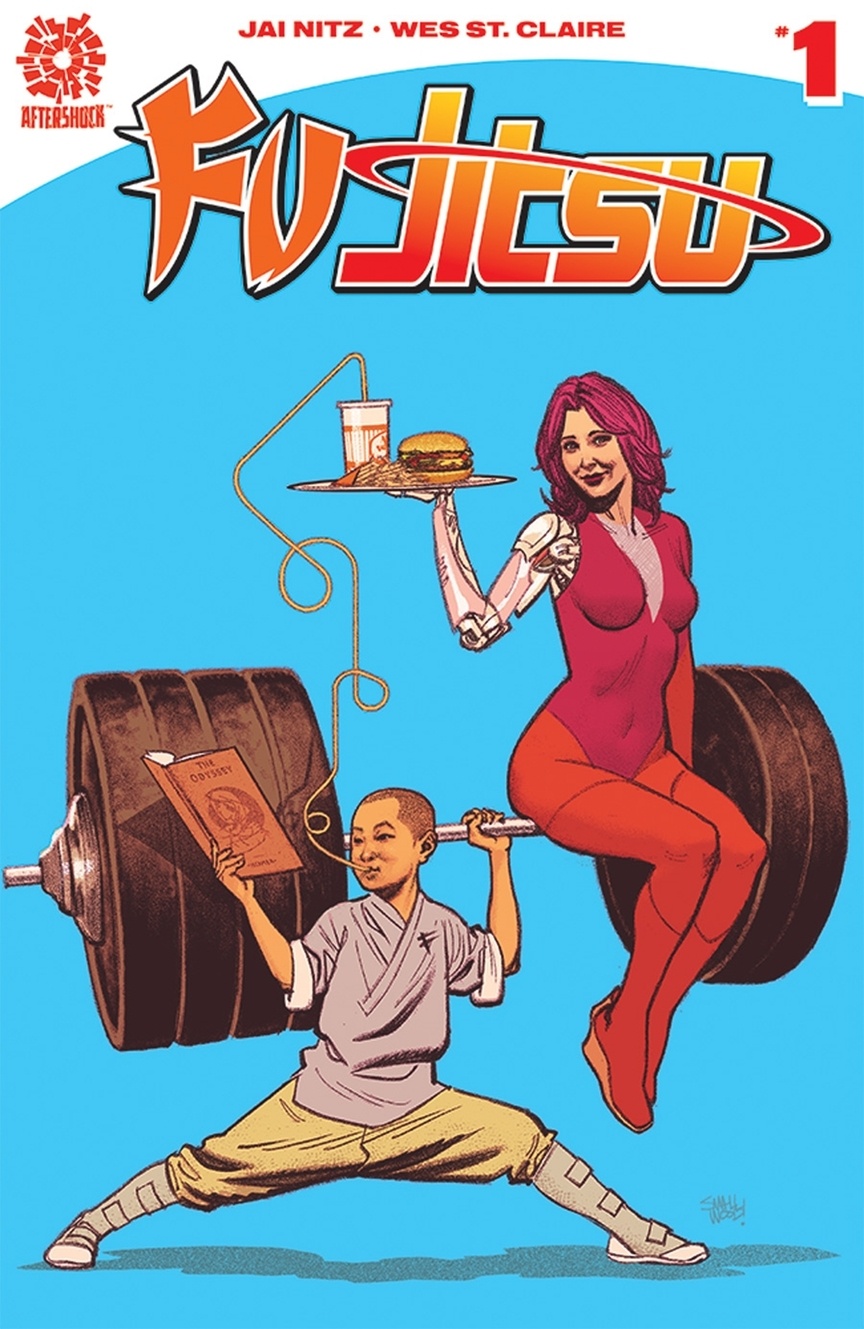Everyone talks about the direct market but no one does anything about it. Well, Jim McLauchlin wrote about it, starting with one of those “I want those cha cha heels!” McGuffins:
Wednesday, September 27 was release day for Fu Jitsu #1 from Aftershock Comics. Not the biggest of debuts, but hey—it’s written by Jai Nitz, who’s a buddy, and it seems an interesting concept. It became appointment buying for me. Right there on the calendar: “Go to comic store, buy Fu Jitsu.”
And there his troubles began.
We wrote about the title when it was announced. The title, by Jai Nitz and Wes St Clair sounds like a fun romp, a bit of a send-up of kung fu bildungsromans, as the hero fights a villainous Robert Wadlow (the world’s tallest recorded man) and James Dean (a famous dead movie star) at the South Pole.
But finding a copy on the shelves of a comics shop? Not as fun. The store McLauchlin went to, a well-regarded one in Los Angeles, had not ordered a single copy of the book, Instead they special ordered it and he vowed to come back in two weeks.
Rather than just cursing the darkness, McLauchlin goes on to interview a bunch of people about all of this, including Diamond’s Roger Fletcher, the VP of sales and marketing at Diamond. And a fuller picture emerges.
If you’ve been reading Brian Hibbs’ columns here you know ordering monthly comics is a daunting task, but how daunting?
“The proliferation of SKUs have made the business more challenging,” he says. “We currently have well over 50,000 SKUs.” Diamond arranges their most popular SKUs in an area where most people are doing the labor in their warehouse to improve internal efficiency. But still, someone is doing single copy pick-and-pack from pallet 12, Row C, Subsection 4 in Olive Branch, unless the store orders it from the jump. Batman and DC Comics is one thing. Fu Jitsu and Aftershock is another.
A SKU (stock keeping unit) is a standard ID code – usually baked into the UPC code – that allows a store or distributor to track it in their inventory. And 50,000 SKUs is a lot.
There’s much more in McLauchlin’s piece, much of it backing up current anger over the flaws in the DM system.
But really, it’s hard to point fingers at guilty parties. It’s the system. Writer Jai Nitz promoted the book the way you’re supposed to; AfterShock marketed it. Free sample issues were made available and personal mailings to retailers were made. But it wasn’t enough in this case. And Collector’s Paradise owner Ed Greenberg sounds the same alarm we’ve been making for a while here at The Beat – if you’re a small periodical publisher, you are on thin ice.
“We tried Aftershock initially, all the titles,” says Ed Greenberg, owner of the Collector’s Paradise stores. “But we’ve seen general malaise toward them. And it’s not just them, it’s many of the similar small publishers.” Collector’s Paradise stocks almost nothing in terms of Aftershock single issues. “We’re more a comic book store, not a comic book store, if you get the difference in my voice,” Greenberg says. “We sell more graphic novels. Aftershock has great creators and their graphic novels can move well for us, but we usually don’t carry Aftershock in single issues.”
As pointed out many times, just getting a store to order a SINGLE COPY of a new #1 title is no given in this market. There’s no visibility on the newsstand. Many smaller stores literally can’t afford to test every product – they don’t have the cash flow to invest in all #1s. Welcome to the small publisher’s nightmare.
But also: if you aren’t putting a ton of energy into your trade program, you are missing the 2017 Comics Boat completely.
While the article advocates the dreaded pre-ordering if you want to actually purchase a non Big Five title at a store, it does hint that Diamond may be looking at more flexible ways of ordering comics:
And if a store wants to eliminate itself as the middleman and speed up the process (at a lower profit margin)? That’s on Diamond’s map as well. “We’re also looking in the direction where if you go to a store for Fu Jitsu #1 and the store doesn’t have it, they can say, ‘Hey, we can get that sent direct to you from our supplier, right to your door.’ Diamond can perhaps facilitate that sale for them,” Fletcher says. “It might not be at the same margin the store usually gets, but there would be something in the middle for that retailer. Again, we’re not there yet, but I can envision that as a possible future.”
Possible future.
We can envision many possible futures here at Stately Beat Manor.
Anyway, as we always say, read the whole piece. It’s a good look at the way the system works…and often doesn’t.
UPDATE: This article has been revised to make is more comprehensible since I originally wrote it at 4 in the morning.








Just log on to Comixology…oh there it is. Done.
Also, reader here- Why should I buy this book? I know of Nitz, but can’t recall anything he wrote off the top of my head, even though I know I read some of his DC work. Have no idea about the artist, but this is the age of “don’t expect the cover artist to draw the inside of the book”, so I have no idea what’s inside.
And those covers? They just fucking confuse me. PUT SOME TEXT ON THE COVER. WORD BALLOONS! Give me something to understand what I get out of this Kung fu book that I don’t get out of Marvel’s six Iron Fist books,
I mean, you;re supposed to judge a book by the cover. That’s the point of the cover.
This is one of the hardest to read/understand articles I’ve ever attempted to read.
Also, this is such a comic book world problem: if something isn’t a hit on day one, it’s a problem. Harry Potter wasn’t a hit the day it was released. I doubt if you went to a book store on the day book one first came out, you probably would have had the same problem that McLauchlin talks about here.
“A SKU (stock keeping unit) is a standard ID code – usually baked into the UPC code – that allows a store or distributor to track it in their inventory. And 50,000 SKUs is a lot.”
Hrm, no, not exactly — a “SKU” is not a code or any specific way to identify an individual object for sale, rather it’s a way to talk about the number of moving parts in general. Its a generic descriptor, rather than a specific piece of inventory, if that makes sense?
And 50k is a lower number than I would have intuitively thought Diamond would have in stock — BookScan, in the numbers that we track, is just over 21k items. Add all of the periodicals, some of them going back a year or more (each one an individual SKU, many of them with 2+ cover variants, each of those also an individual SKU), and then the toys and apparel and cards and games that Diamond stocks…. well, its less than I would have imagined.
-B
50,00 SKUS isn’t even more than what’s in your average supermarket. By comparison Ingram maintains a catalog of 14 million in print titles the bulk of which are available for delivery within two days.
I think it’s more a case of the same problem “Spy Seal” faced, the concept simply doesn’t appeal to the vast majority of comic book fans.
I don’t really sense any sort of demand for a “hip martial arts comic” in 2017.
The system is. If you saw an upcoming comic and put it on your calendar, send your comic store an email and they’ll reserve it for you. Or wait for the gears to move if it’s not at your store. I definitely can see a future where even physical comic books are purchased on a digital marketplace and shipped directly to customers. That’s the real Amazon model. If you like your comic store experience, use the system, talk to the owner and clerks, and visit often.
Most of the answers to the questions regarding Fu Jitsu can be found here: bit.ly/ascfuji
AfterShock also has an eStore in which you can order the print comics directly: bit.ly/ascEstore
Nick’s comment is spot-on.
There is a great follow-up article here: https://icv2.com/articles/talk-back/view/38719/jen-king-space-cadets-comics-store-reordering
Raise your hand if this is the first time you’ve heard Jim McLauchlin’s name mentioned since the press release announcing he was leaving Wizard: The Guide to Comics.
Dude just completely fell off the planet.
(Google shows he did appear in a Bleeding Cool article a couple years ago for spending too much money with Hero Initiative.)
Comments are closed.